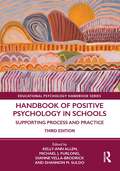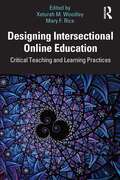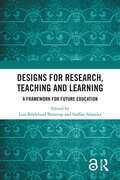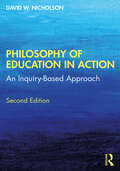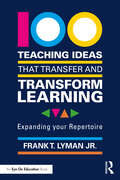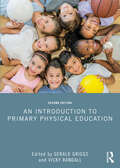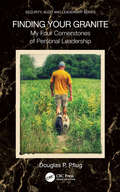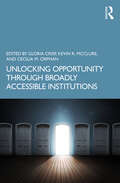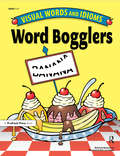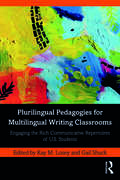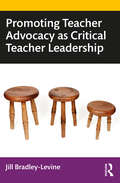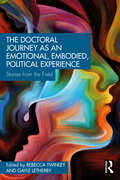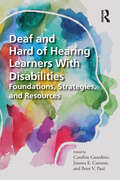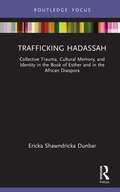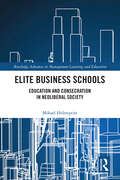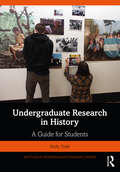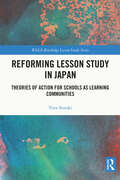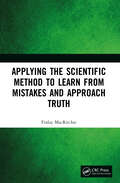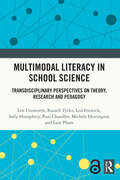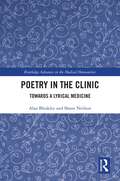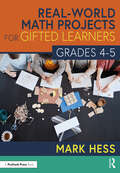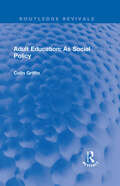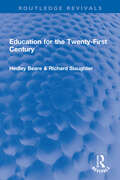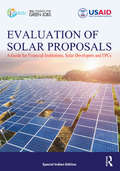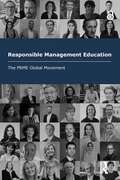- Table View
- List View
Handbook of Positive Psychology in Schools: Supporting Process and Practice (Educational Psychology Handbook)
by Kelly-Ann AllenThe Handbook of Positive Psychology in Schools offers the most current and comprehensive insights into how positive psychology principles provide a framework for young people to become active agents in their own learning. The third edition of this groundbreaking volume assembles the latest global research identifying fundamental assets—hope, optimism, gratitude, self-efficacy, emotional regulation, among others—that support students’ learning and well-being. Chapters examining social-ecological perspectives on classroom quality and school climate provide best practice guidance on schoolwide policies and practices. These 35 new chapters explore positive psychology’s ongoing influence and advances on prevention, intervention, and assessment practices in schools.
Designing Intersectional Online Education: Critical Teaching and Learning Practices
by Xeturah M. WoodleyDesigning Intersectional Online Education provides expansive yet accessible examples and discussion about the intentional creation of online teaching and learning experiences that critically center identity, social systems, and other important ideas in design and pedagogy. Instructors are increasingly tasked with designing their own online courses, curricula, and activities but lack information to support their attention to the ever-shifting, overlapping contexts and constructs that inform students’ positions within knowledge and schooling. This book infuses today’s technology-enhanced education environments with practices derived from critical race theory, culturally responsive pedagogy, disability studies, feminist/womanist studies, queer theory, and other essential foundations for humanized and socially just education. Faculty, scholars, technologists, and other experts across higher education, K-12, and teacher training offer fresh, robust insights into how actively engaging with intersectionality can inspire designs for online teaching and learning that are inclusive, intergenerational, anti-oppressive, and emancipatory.
Designs for Research, Teaching and Learning: A Framework for Future Education
by Lisa Björklund Boistrup Staffan SelanderThis book offers a coherent theoretical and multimodal perspective on research, teaching and learning in different non-formal, semi-formal, and formal learning environments. Drawing on examples across a range of different settings, the book provides a conceptual framework for research on learning in different environments. It provides conceptual models around learning design which act as a framework for how to think about contemporary learning, a guideline for how to do research on learning in different sites, and a tool for innovative, collaborative design with other professionals. The book highlights concepts like multimodal knowledge representations; framing and setting; transformation, transduction, and re-design; signs of learning and cultures of recognition in different social contexts. The book supports innovative thinking on how we understand learning, and will appeal to academics, scholars and postgraduate students in the fields of education research and theory, learning sciences, and multimodal and social semiotics. It will also be of interest to school leaders, university provosts and professionals working in education. The Open Access version of this book, available at www.taylorfrancis.com, has been made available under a Creative Commons Attribution-Non Commercial-No Derivatives 4.0 license.
Philosophy of Education in Action: An Inquiry-Based Approach
by David W. NicholsonPhilosophy of Education in Action: An Inquiry-Based Approach (Second Edition) is an innovative introductory text that invites readers to explore philosophy of education through the lens of their own observations and experiences. Using the Wonder Model of Inquiry, readers investigate the purposes of education, how schools are designed to fulfill those purposes, and the influence of philosophy on educational practices. Grounded in authentic classroom vignettes and supported by examples from actual schools and educational programs, readers think critically and creatively about philosophical issues. Probing questions analyze the curriculum, examine pedagogy, conceptualize the role of the teacher and student in the learning process, and explore the role of school organization and design. Readers are guided to reflect upon their own practices and articulate their own philosophical beliefs. Readers also imagine and design a hypothetical school using project-based methods to interpret, synthesize, and evaluate different educational philosophies. The Continuum of Educational Philosophy locates practices in relation to philosophical perspectives. The Second Edition includes updated sources and examples of schools and programs that represent different philosophical perspectives. In addition to applying the "3Cs" criteria of evaluation, two new chapters highlight voices that respond to and challenge different educational philosophies. The final chapter adds guidance on how to construct and compose a personal philosophy of education statement.
100 Teaching Ideas that Transfer and Transform Learning: Expanding your Repertoire
by Frank T. Lyman Jr.Expand your teaching repertoire with this unique collection of instructional ideas. Author Frank T. Lyman, Jr., esteemed educator and creator of the Think-Pair-Share model, offers ways to help students think critically, encounter puzzling phenomena and seek explanations, think before responding, listen to responses from others, create their own questions, visualize a scene, employ problem-solving strategies, and more. Appropriate for teachers of all grades and subjects, the ideas address the pursuit of true learning—wanting to learn, how to learn, and enabling to learn—and can easily be adapted and applied to a wide variety of contexts. The book's format allows you to pick and choose activities for your own professional development journey and make them your own, so you can expand your teaching toolbox and bring more students to deeper levels of learning.
An Introduction to Primary Physical Education
by Gerald Griggs Vicky RandallNow in a fully revised and fully updated new edition, this comprehensive introduction to the teaching of Physical Education in primary schools is still the only textbook to cover the full sweep of the subject, from policy and curriculum developments to best practice and current debates. Written exclusively by primary Physical Education specialists, with primary school teaching experience, the book highlights the importance of Physical Education in the primary curriculum and the key issues facing primary teachers today, such as inclusion, training needs and the development of creativity. Central to the book are core chapters that examine each functional area common to many primary Physical Education syllabi – including games, dance, gymnastics, athletics and outdoor learning – and give clear, practical guidance on how to teach each topic. This new edition includes three completely new chapters, covering leadership, stakeholder interest in Physical Education delivery, and how to manage transitions. Rooted throughout in sound theory and the latest evidence and research, this book is essential reading for all students, trainee teachers and qualified teachers looking to understand and develop their professional practice in primary Physical Education.
Finding Your Granite: My Four Cornerstones of Personal Leadership (Security, Audit and Leadership Series)
by Douglas P. PflugIn "Finding your Granite", Executive Leadership Coach and Mentor Douglas Pflug walks you through some of the life experiences, lessons and key take-ways from his years as a dual sport university athlete, 28 years as a police officer, 30 years as an elite strength and conditioning coach, mentor and leader. Douglas accomplishes this through four very dynamic, energetic and heartfelt sections entitled: "The Struggle" "Dash Leadership" "Four Cornerstones of Personal Leadership" and "Rise Up and Excel". The Author’s mentoring and protégé process and implementation of #RiseUpAndExcel and #StrongerFasterFitter methodologies assists people in discovering "who they were, who they are and whom they want to be" moving forward in this post COVID 19 world. This book was written through the eyes of an "everyday guy" and designed to educate, entertain and inspire front line 911 emergency workers to seek and achieve their potential. Additionally, this book will also be an essential resource for individuals and business leaders who wish to stay ahead of the evolving leadership trends of strategic thinking, inspiration and motivation, strong interpersonal skills, vision, decisiveness and passion.
Unlocking Opportunity through Broadly Accessible Institutions
by Gloria Crisp Kevin R. McClure Cecilia M. OrphanThis groundbreaking resource highlights the unique mission and purpose of bachelor’s degree granting accessible institutions (BAIs), exploring the challenges and opportunities present within these institutions, and offering a counterpoint to the current dialogue that frames these institutions with a deficit-perspective. Featuring a broad range of esteemed and influential voices in the field of higher education, policy research, and administration, this unique collection argues that BAIs are an important but overlooked category of institutions in American post-secondary education, and demonstrates the critical role that BAIs play in the higher education landscape, distinct from traditional community colleges and elite universities. Chapters cover key issues such as educational policy, leadership opportunities, faculty, the role of geography, racial equity, and developmental education. Ultimately, this edited volume challenges damaging assumptions about the organizational nature, purpose, and role of BAIs in shaping educational opportunity for diverse student populations, and therefore contributes valuable scholarship to the ongoing dialogue and debate around achieving equity in higher education access in the United States.
Word Bogglers: Visual Words And Idioms, Grades 3-6
by Dianne DrazeAre you looking for a motivating way to combine problem solving, visual discrimination, and language? Word Bogglers is just what you need. A word boggler is a puzzle, a brain teaser, and a lesson in language, all rolled into one. These clever visual puzzles use words and phrases to build flexible thinking and word literacy. Each word boggler is a word or phrase that has been written so that its meaning is conveyed via the position, number, or size of the words and letters. Some of the puzzles are words while some are familiar idioms and clichés. Thus, this book brings an opportunity to develop vocabulary and knowledge of often-used phrases in the form of motivating brainteasers. Each page features six of these visual puzzles. Students analyze the way the words are written (size, position, and direction) to solve each boggler and match it with its definition. A way to further reinforce the understanding of each phrase is to have students use the phrases in a written sentence. You can use these puzzles in a variety of ways, including: putting them on the overhead for a quick daily thinking challenge, using them as starting points for daily writing exercises, using an entire page for a weekly challenge, forming groups to work together on solving the puzzles, using them in a learning center, and having students make up their own puzzles. Bring Words Bogglers into your classroom today. The result of using these word puzzles is lots of fun, lots of challenge, and increased knowledge of the meaning of common idioms and words. For more word puzzles, see The World's Greatest Brain Bogglers and Brain Twisters!
Plurilingual Pedagogies for Multilingual Writing Classrooms: Engaging the Rich Communicative Repertoires of U.S. Students
by Kay M. Losey Gail ShuckA much-needed resource on plurilingual pedagogies, this book counters the common dominant English-only approach found in writing and composition classrooms by identifying practices and pedagogies that support multilingual students. Providing a window into a range of contexts and classrooms where students’ full identities are honored, contributors offer research-grounded strategies and pedagogies that allow students to harness all of their language resources in order to build on their strengths and develop their writing abilities. The specific examples in this book, drawn from high school and college writing contexts, demonstrate the value of embracing linguistic diversity in writing programs. Presenting a wide range of models and strategies from top scholars that center students’ linguistic repertoires as strengths, the volume addresses classroom teaching, assessment, curriculum, school administration, and more, all from an asset-based orientation. This book is ideal for courses in composition and second-language writing pedagogy as well as for students, scholars, and educators in second language writing, language and literacy education, and composition studies.
Promoting Teacher Advocacy as Critical Teacher Leadership
by Jill Bradley-LevineTimely and accessible, this book critically explores the meaning and practice of teacher advocacy. Drawing from the work of teachers who advocate with and for students who are traditionally marginalized—including students of color, students with exceptionalities, students in poverty, and immigrant students—this volume investigates classroom realities like inequitable distribution of resources, student trauma, and uneven support for teachers’ work from administrators. Unlike other texts on teacher activism, this book embeds activism within an existing leadership framework and strategies that teachers enact within the classroom, across the school, and in their communities. Foregrounding data in the five case studies, this book is an invaluable resource for pre-service teachers and scholars in teacher education, social justice education, and educational leadership.
The Doctoral Journey as an Emotional, Embodied, Political Experience: Stories from the Field
by Gayle Letherby Rebecca Bex TwinleyThe Doctoral Journey as an Emotional, Embodied, Political Experience is the first text of its kind to capture stories of involvement in doctoral journeys from students, supervisors, and examiners. Drawing from experiences across a variety of disciplines in the social sciences, medical sciences, education and the humanities, these stories share a keenness to demonstrate the ways in which this journey is emotional (rather than detached), embodied (rather than separated), and political (rather than having no relationship to politics). The journey metaphor is often adopted to describe and explore the PhD process. However, this journey is usually only seen from the perspective of the doctoral candidate. This implies that it is only the student that learns, develops, and reflects. This is clearly not always (maybe never) the case. The suggestion that the candidate ‘learns’ whilst the supervisors ‘teach’ harks back to traditional masculinist educational approaches and neglects the reciprocal knowledge-sharing process between student and supervisor. Similarly, the prescription that relationships between all concerned remain ‘professional’ and removed, rather than in any way intimate, suggest an unrealistic acceptance of an scientific, detached objective agenda rather than an emotional, embodied, political, and holistic approach to research. The contributions to this book extend the journey metaphor to additionally consider the experiences of supervisors and examiners, including the joint, collaborative journey of the ‘team’ (the candidate, their supervisors, and their examiners). This provides a challenge to traditional understandings of the doctoral process and offers implications for future reflection and practice. This book is therefore an invaluable resource for doctoral students, supervisors, examiners, and readers interested in pedagogy and educational practice.
Deaf and Hard of Hearing Learners With Disabilities: Foundations, Strategies, and Resources
by Caroline Guardino Joanna E. Cannon Peter V. PaulThis volume offers foundational information and research-based strategies for meeting the needs of deaf and hard of hearing learners with disabilities. The disabilities covered in this volume include developmental delays, autism spectrum disorder, intellectual and learning disabilities, deafblindness, emotional and behavioral disorders, attention deficit hyperactivity disorder, and a variety of high incidence syndromes. Contributors examine the literature within each disability category, share best practices, and consider demographics/characteristics, intervention/identification, placement, communication/language, psychosocial issues, assistive technologies/accommodations, assessments, and transition/post-secondary outcomes. Each chapter begins with learning objectives and concludes with discussion questions and a resource list. Deaf and Hard of Hearing Learners with Disabilities is an essential book for courses at the undergraduate and graduate level, and in workshops and webinars for in-service teachers, professionals, and families.
Trafficking Hadassah: Collective Trauma, Cultural Memory, and Identity in the Book of Esther and in the African Diaspora (Rape Culture, Religion and the Bible)
by Ericka Shawndricka DunbarThe representation of sexual trafficking in the book of Esther has parallels with the cultural memories, histories, and materialized pain of African(a) girls and women across time and space, from the Persian Empire, to subsequent slave trade routes and beyond. Trafficking Hadassah illuminates that Africana female bodies have been and continue to be colonized and sexualized, exploited for profit and pleasure, causing adverse physical, mental, sexual, socio-cultural, and spiritual consequences for the girls and women concerned. It focuses on sexual trafficking both in the biblical book of Esther and during the transatlantic slave trade to demonstrate how gender and racism intersect with other forms of oppression, including legal oppression, which results in the sexual trafficking of African(a) females. It examines both the conditions and mechanisms by which the trafficking of the virgin girls (who are collectively identified) are legitimated and normalized in the book of Esther, alongside contemporary histories of Africana females. This important book examines ideologies and stereotypes that are used to justify the abuse in both contexts, challenges the complicity of biblical readers and interpreters in violence against girls and women, and illustrates how attention to the nameless, faceless African girls in the text is impacted by the #MeToo and #SayHerName social movements. This book will be of particular interest to those studying the Bible, religion, gender, theology, and sex trafficking. It is also an important book for those in the related fields of Africana Studies, Trauma Studies, Post-Colonial Studies, Diaspora Studies, Critical Race Studies, as well as to the general reader.
Elite Business Schools: Education and Consecration in Neoliberal Society (Routledge Advances in Management Learning and Education)
by Mikael HolmqvistSocial scientists are paying increasing attention to the business and financial elites: There’s a great need to understand who these elites are, what they do, and what makes them tick, as individuals but also as a class. By examining elite business schools, the institutions that train and prepare people to assume important leadership and decision-making positions in business, finance and related sectors, we may also learn how the economic elites are made. A key argument in this book is that elite schools are known to create powerful groups in society, offering them the intellectual and analytical means to act as leaders, but, most importantly, the social, moral and aesthetic skills that are deemed necessary to exercise power; in all essential respects elite schools consecrate people. By dominating much of higher education today, and by doing so in a way that creates and reproduces a market-based organization and control of society, elite business schools represent certain interests and ideologies that affect the lives of most people. In understanding how the modern economy is run, elite business schools, therefore, represent critical study objects. This book, based on an in-depth study of the Stockholm School of Economics (SSE), offers a sociological analysis of the world of elite business schools. Specifically, this book examines the consecration of SSE’s students from a number of perspectives and in a number of situations, focusing on student union activities, school culture, faculty behavior, teaching, courses and alumni events, noting the symbolic importance of economics and particularly the school’s unique relation among the world’s business schools to the Nobel Prize. The book addresses the topics with regards to the sociology of elites, management education and organizational studies and will be of interest to researchers, academics, and students also interested in business history, higher education studies, and sociology of education.
Undergraduate Research in History: A Guide for Students (Routledge Undergraduate Research Series)
by Molly ToddUndergraduate Research in History offers a blend of theory and practice for undergraduate researchers in history, relevant to new routines of the digital age. Explaining how research conducted by undergraduate students fits into the broader contexts of the discipline of history and the expanding realm of undergraduate research, this book presents the major phases of substantive research projects, and offers practical advice for work in specific historical areas as well as in interdisciplinary projects. The volume addresses key issues facing researchers, including finding relevant sources, funding research projects, and sharing results with diverse audiences. Supported by dozens of examples of real-world undergraduate research projects, this book is an indispensable reference for any student embarking on historical research and for professors guiding and collaborating with undergraduate researchers.
Reforming Lesson Study in Japan: Theories of Action for Schools as Learning Communities (WALS-Routledge Lesson Study Series)
by Yuta SuzukiThis book elucidates the formation and development of theories of action in school reforms for Schools as Learning Communities (SLC) during ten years from its inception in 1998 in select Japanese elementary schools, junior high schools, and one secondary school. While growing international interest in Japanese lesson study is in pursuit of a standard lesson study, Suzuki offers a unique perspective into school reforms for SLC and how they resisted the standardization of lesson study out of concerns that it would limit a teacher’s autonomous judgment and choice. Through a theory-of-action approach in its examination of the pilot schools for SLC, this book clarifies: • Why did teachers reform lesson study? • What were the difficulties in reforming lesson study? • Why were teachers working on school reform for SLC? • Why did the school reform for SLC evolve from an elementary school to the junior high schools and high schools? This book provides a theoretical foundation for reviewing the past efforts and histories of Japanese lesson study reforms, and will interest academics and practitioners looking for insights into the future of lesson study.
Applying the Scientific Method to Learn from Mistakes and Approach Truth
by Finlay MacRitchieIn its simplest form, the scientific method can be thought of as learning from our mistakes and trying to correct them. True scientists try to think rationally, never adopt dogmatic opinions and are always willing to listen to opposing views. They never claim to know the absolute truth but are relentless in their search for it. In this timely book, the author describes the fundamentals of critical scientific thinking. The book further examines the correct use of the scientific method and how to apply it to current events and scientific topics to obtain honest assessments. Current controversies discussed include climate change and COVID-related lockdowns. Additional Features include: Demonstrates the use of the scientific method to assist with objective analysis of issues. Addresses that induction plays a role but the true method for advancing knowledge is hypothesis-deduction. Explores current hot topics within the framework of the scientific method. Outlines common misunderstandings of the scientific method. Applying the Scientific Method to Learn from Mistakes and Approach Truth is approachable enough for the general public and recommended for university and advanced high school science educators and their students.
Multimodal Literacy in School Science: Transdisciplinary Perspectives on Theory, Research and Pedagogy
by Len Unsworth Russell Tytler Lisl Fenwick Sally Humphrey Paul Chandler Michele Herrington Lam PhamThis book establishes a new theoretical and practical framework for multimodal disciplinary literacy (MDL) fused with the subject-specific science pedagogies of senior high school biology, chemistry and physics. It builds a compatible alignment of multiple representation and representation construction approaches to science pedagogy with the social semiotic, systemic functional linguistic-based approaches to explicit teaching of disciplinary literacy. The early part of the book explicates the transdisciplinary negotiated theoretical underpinning of the MDL framework, followed by the research-informed repertoire of learning experiences that are then articulated into a comprehensive framework of options for the planning of classroom work. Practical adoption and adaptation of the framework in biology, chemistry and physics classrooms are detailed in separate chapters. The latter chapters indicate the impact of the collaborative research on teachers' professional learning and students’ multimodal disciplinary literacy engagement, concluding with proposals for accommodating emerging developments in MDL in an ever-changing digital communication world. The MDL framework is designed to enable teachers to develop all students' disciplinary literacy competencies. This book will be of interest to researchers, teacher educators and postgraduate students in the field of science education. It will also have appeal to those in literacy education and social semiotics.
Poetry in the Clinic: Towards a Lyrical Medicine (Routledge Advances in the Medical Humanities)
by Alan Bleakley Shane NeilsonThis book explores previously unexamined overlaps between the poetic imagination and the medical mind. It shows how appreciation of poetry can help us to engage with medicine in more intense ways based on ‘de-familiarising’ old habits and bringing poetic forms of ‘close reading’ to the clinic. Bleakley and Neilson carry out an extensive critical examination of the well-established practices of narrative medicine to show that non-narrative, lyrical poetry does different kind of work, previously unexamined, such as place eclipsing time. They articulate a groundbreaking ‘lyrical medicine’ that promotes aesthetic, ethical and political practices as well as noting the often-concealed metaphor cache of biomedicine. Demonstrating that ambiguity is a key resource in both poetry and medicine, the authors anatomise poetic and medical practices as forms of extended and situated cognition, grounded in close readings of singular contexts. They illustrate structural correspondences between poetic diction and clinical thinking, such as use of sound and metaphor. This provocative examination of the meaningful overlap between poetic and clinical work is an essential read for researchers and practitioners interested in extending the reach of medical and health humanities, narrative medicine, medical education and English literature.
Real-World Math Projects for Gifted Learners, Grades 4-5
by Mark HessHelping bring mathematics and engineering to life, these challenging lessons give teachers an exciting tool for engaging advanced learners through creativity and hands-on products. Units are driven by standards and invite students to become baseball field architects, create flying jellyfish, make a gnome hat parachute, scale skyscrapers, and more! Each project includes step-by-step lesson plans with reproducible templates, time estimates, and a materials list. While centered on STEAM (science, technology, engineering, arts, and mathematics) competencies, true to real-world experiences, these hands-on projects span the curriculum—including writing and public speaking—and while they suit entire classrooms and smaller groups, they can also be easily adapted to individual projects for independent study and home school.
Adult Education: As Social Policy (Routledge Revivals)
by Colin GriffinFirst published in 1987, Adult Education: As Social Policy intends to provide an introduction to the social policy analysis of adult education, contributing to the larger literature around lifelong or continuing education. The roots of policy in alternative social welfare models are traced to their ideological sources and to the origins of adult education theory itself. The development of professionalism is also considered in relation to policy analysis and there is a case study of major policy documents to illustrate the analysis. The book will be of interest to students of pedagogy, education, and policy.
Education for the Twenty-First Century (Routledge Revivals)
by Hedley Beare Richard SlaughterFirst published in 1993, Education for the Twenty-First Century grew out of a common and deep-seated concern about the way young people think of their own future, and about some of the relatively simplistic education reforms advocated, often by people with scant comprehension of modern educational practices. Schools as institutions, schooling patterns, the curriculum and teachers themselves have come under heavy criticism, but it has to be recognized that the problems in education have no lasting or satisfactory solutions while schools continue to operate out of the framework which has determined their raison d’être for the past two hundred years. The authors argue that schools do not need fine tuning, or more of the same; rather some of the fundamental assumptions about schooling have to be revised. They argue that learning about the future must become very much a part of the present, and they set out in the book some of the thinking and several techniques which permit us to confront the future and make it a more friendly place. The book will be of interest to students, teachers and policymakers.
Evaluation of Solar Proposals: A Guide for Financial Institutions, Solar Developers and EPCs
by Bishnoi Tanmay; Khanna Ronnie; Karandikar Arvind; Bishnoi DeepankerThis handbook deals with the subject of how an individual can review and evaluate a detailed project report of a Solar PV power plant, which includes feasibility study of the site for installation, assessing of the techno - commercial feasibility, determining the financial viability of setting up a Solar PV Power Plant.
Responsible Management Education: The PRME Global Movement (The Principles for Responsible Management Education Series)
by Principles for Responsible Management EducationThe ebook will be Open Access and made available on publication. Written by many of the key influencers at the Principles for Responsible Management Education (PRME), the book focuses on advancing sustainable development into education, research and partnerships at higher education institutions and, specifically, at business schools, with the purpose of educating responsible leaders for today and tomorrow. The book serves as a concrete source of inspiration for universities and other stakeholders in higher education on structures, processes and content for how to advance responsible management education and sustainable development. It articulates the importance of key themes connected with climate change, gender equality, anti-corruption, business for peace, anti-poverty and other topics that are related to the Sustainable Development Goals (SDGs). The book emphasizes the significance of local–global interaction, drawing on local action at management schools in combination with global knowledge exchange across the PRME community. In addition, the book clearly demonstrates the background, key milestones and successful achievements of PRME as a global movement by management schools in collaboration with a broader community of higher education professionals. It exemplifies action in various local geographies in PRME Chapters, PRME Working Groups and the PRME Champions work to advance responsible management education. The authors of the book are all globally experienced deans, professors, educators, executives and students with a global outlook, who are united to advance responsible management education locally and globally. The book will be invaluable reading for university leaders, educators, business school deans and students wanting to understand and embed responsible management education approaches across their institutions and curricula.
